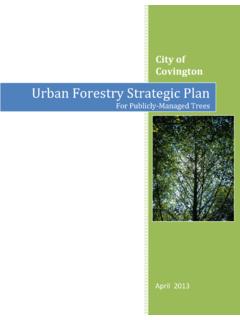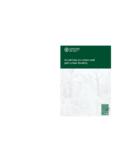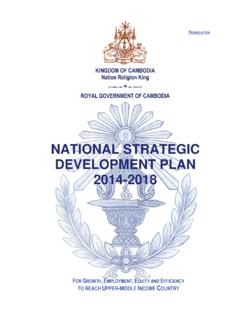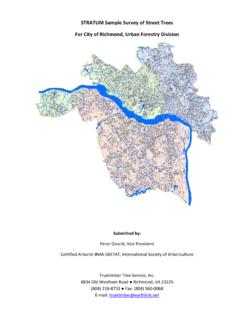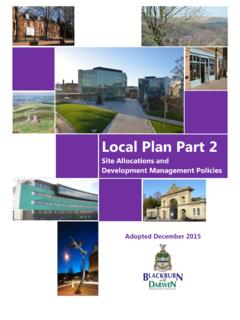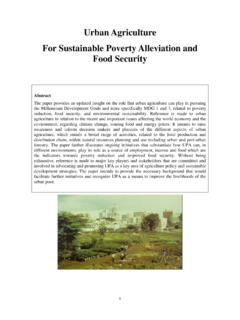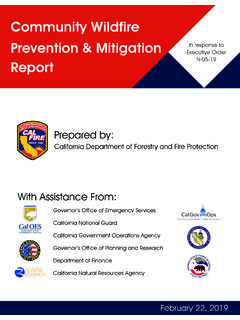Transcription of THE SUPREME COURT OF APPEAL OF SOUTH AFRICA …
1 THE SUPREME COURT OF APPEAL OF SOUTH AFRICA JUDGMENT Reportable Case No: 446/2017 In the matter between: SOUTH AFRICAN NATIONAL PARKS APPELLANT and MTO FORESTRY (PTY) LTD FIRST RESPONDENT PARKSCAPE SECOND RESPONDENT Neutral citation: SOUTH African National Parks v MTO Forestry (Pty) Ltd & another (446/2017) [2018] ZASCA 59 (17 May 2018) Coram: Navsa, Leach and Dambuza JJA and Davis and Rogers AJJA Heard: 1 March 2018 Delivered: 17 May 2018 Summary: Administrative law whether management framework and totality of relevant evidence including previous public participation concluded in anticipation of implementation of statutory park management plan was proper basis for legitimate expectation document to be interpreted comprehensively legitimate expectation established.
2 2 Contractual power exercised by public body variation of the contract constituted administrative action contractual rights had to be exercised within the administrative justice framework where procedural fairness requirement not observed administrative action reviewed and set aside. _____ ORDER _____ On APPEAL from: Western Cape Division, Cape Town (Gamble J). The APPEAL is dismissed with costs including the costs of two counsel. _____ JUDGMENT _____ Dambuza JA (Navsa and Leach JJA and Davis AJA concurring) [1] At the heart of this APPEAL is the question whether the appellant, the SOUTH African National Parks (SANP arks), had a duty to consult the second respondent, Parkscape, prior to allowing the first respondent, MTO Forestry (Pty) Ltd (MTO) to vary a previously agreed tree felling programme in the Tokai Forest, Cape Town, in terms of a lease agreement between the two.
3 That approval was reviewed and set aside by the Western Cape Division of the High COURT , Cape Town (Gamble J) at the instance of Parkscape, for procedural unfairness. The high COURT then interdicted and restrained MTO from felling the trees in terms of the revised tree felling programme. This APPEAL is with the leave of the COURT a quo. [2] These proceedings were instituted at the instance of Parkscape, a non-profit organisation whose interest is the creation of safe, biodiverse, open and shaded urban parks in the buffer zones of the Table Mountain National Park . Parkscape s case in the COURT below and before us was that, to vary the lease so as to accelerate 3 the felling process was an exercise of public power, necessitating public participation before the variation took place, particularly because of prior extensive public participation in relation to the management of the Tokai forest.
4 SANP arks case was that the decision to accelerate the felling process and to vary the lease accordingly was taken in terms of contractual provisions and that the decision was not subject to public law processes. It further contended that the decision was not taken in pursuit of its statutory duties and was therefore not an administrative decision. [3] The Tokai Forest forms part of the world famous Table Mountain National Park (TMNP). It comprises a wide variety of trees, including camphor and poplar trees, eucalyptus and pine plantations, and various indigenous trees. It offers a wide range of recreational facilities for use by the residents of the City of Cape Town.
5 It is administered in terms of various pieces of legislation, including the National Forests Act 84 of 1998 (the NFA) and the National Environmental Management: Protected Areas Act, 57 of 2003 (NEMPAA). [4] Before 2005 the government was responsible for managing the country s commercial forestry plantations. By 1999 it had taken a policy decision to dispose of a majority interest in its commercial forestry activities to MTO, which was initially a wholly owned subsidiary of the SOUTH African Forestry Company Limited (SAFCOL). On 25 January 2005 the Department of Water Affairs and Forestry concluded a 20 year lease agreement with MTO in terms of which the latter would clear-fell the Tokai forest plantations over the 20 year lease The lease agreement contemplated that the lessor s rights, obligations and responsibilities in relation to the Tokai and Cecilia Plantations would be assigned to SANP arks.
6 Indeed, on 11 February 2005, the assignment occurred. [5] The lease agreement entitled MTO to harvest approximately 600 hectares of the Tokai plantations over a 20 year period. SANP arks was responsible for managing MTO s performance of its obligations under the lease. It considered that a long-term strategic framework for the Tokai Forest was necessary. Consequently, in late 2006 a process started to compile the framework. As the forest fell within a protected area 1 The lease agreement related to the Tokai and Cecilia Plantations. The latter is located in Constantia, Cape Town.
7 However these proceedings only pertain to the Tokai Forest. 4 this process was conducted in terms of NEMPAA. A public participation process was initiated to identify shareholders concerns. That process revealed divergent views: on-going public concern about the loss of shade trees on the one hand, and the loss of biodiversity on the other. This led to the establishment of a broad consultative process by the then mayor of Cape Town, Ms Helen Zille, with the support of the manager of the TMNP. Professor Richard Fuggle of the University of Cape Town was asked to facilitate the process between all of the interested parties.
8 Following the extended public participation process, a Revised Management Framework (management framework) was presented to the public during December 2007. [6] The management framework articulated a compromise between those who favoured the retention of the plantations and those who favoured their removal. This compromise entailed among other things, the creation of transition planting areas where fynbos would only be permanently re-established after 38 years. The existing pine gum trees would be felled and then the land burnt to encourage Fynbos regeneration. The Fynbos would be allowed to regenerate for 8 years to allow seed to be dispersed into the soil.
9 Thereafter appropriate non-invasive shade giving trees would be planted and allowed to grow for 30 years, providing shaded recreational areas. After 30 years of growth the trees would be harvested, allowing the Fynbos to return on a permanent basis. The management framework presented a profile for the future management of Tokai and Cecilia as an integral part of the TMNP. Although completed in 2009 it covered the same period as the lease agreement (2005 to 2025). [7] The events which culminated in these proceedings started in March 2015 when a major fire damaged most of the plantation components in the Upper Tokai Forest.
10 In July 2016 MTO addressed a letter to SANP arks requesting that it be allowed to harvest the Dennendal portion of the Tokai Forest later that year, and that it exits the lease at the end of 2017. In terms of the original felling schedule which was part of the lease agreement, Dennendal was only due to be harvested during the period 2021 until the end of the lease period in 2025. [8] On 29 August 2016 SANP arks gave public notice of acceleration of the felling programme as requested by MTO. The reason advanced for the change of 5 programme was that the March 2015 fire had damaged most of the plantation compartments in the Upper Tokai Forest in 2015.










